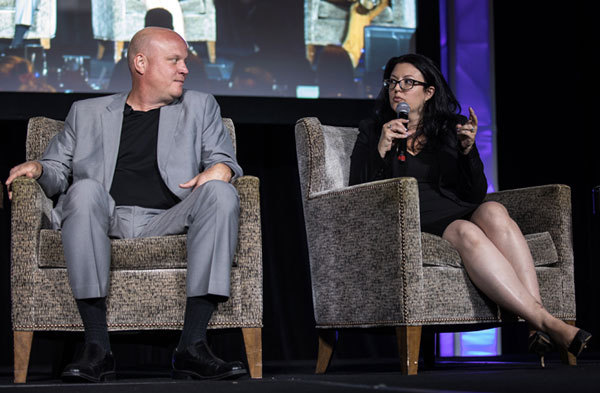✕

Column: industry Tag: hotel industry,hotel stay,trends Published: 2017-08-25 13:44 Source: Author:

From left: Lucas Cobb of MMGY Global and Susan Spinney Corlett of Expedia spoke on the “What the democratization of travel means for hotels” panel at the 2017 Hotel Data Conference. (Photo: Event Coverage Nashville)
NASHVILLE, Tennessee—The list of what guests want from a hotel stay is large and ever-changing, and to keep that in view, it sometimes helps to take a step back.
Hoteliers received some helpful big-picture perspective from experts from Airbnb, Expedia and MMGY Global on a panel titled, “What the democratization of travel means for hotels” at the 2017 Hotel Data Conference.
Speakers provided advice on enhancing the travel experience, gathering data on guests and working with other cohorts of the travel industry. They also identified some trends hoteliers should be aware of.
Big-picture trends
Lucas Cobb, VP of integrated planning at MMGY Global, talked about a trend he calls “the on-location.”
“So as the millennials grow into the family life stage, we see them traveling a lot more—not for purposes of leisure, but for purposes of checking the boxes,” he said. “All their friends are getting married; they have to (visit) grandma and grandpa … 70% of vacations for that generation are for obligations that they have.”
Susan Spinney Corlett, senior director of market management at Expedia, named bleisure as another big trend in travel.
“(It’s) business and leisure, (and) 43% of travelers are combining the two,” she said. “The great thing about that is you have a longer length of stay, four to six days for the traveler, so I think it’s really important as a hotel partner to be thinking about, ‘how do we satisfy that experience when it’s two different types of trips?’ We want to make sure we’re getting that.”
Peter Coles, head economist at Airbnb, said more and more Airbnb guests want a truly local experience.
“Eighty-plus percent, pushing 90%, want to live like a local,” he said. “And figuring out exactly what that means and providing not just a place to stay in an interesting local area, but everything else, that helps you feel less like a tourist and more like an authentic, short-term member of that community.”
Categorizing travelers
Some companies look at demographic data to personalize the guest experience, but others are starting to look more at the psychographic side. Corlett said Expedia uses both.
“We want to know how travelers eat, sleep (and dream) about travel, so I don’t think for us it’s killing one or the other,” she said. “But it’s really important that you use that data and adapt to the needs of each demographic.”
She added that Expedia invests in money, data and technology to decipher the data and share it with hoteliers to help create a better customer experience.
For MMGY Global, demographics are becoming less important, Cobb said.
“Income is still important, geography is still important … but right now, we can access 5,000 data points on any one consumer. And it might not be the fact that they make $100,000 and … they’re married with families; it might just be that they own a dog and they want a dog-friendly hotel,” he said. “So when we look at marketing and messaging strategies, we’re looking more and more on the psychographic sort of behavioral side and less on the (demographic) side.”
Coles said Airbnb tries to shift its focus away from the broad categorizations of demographics to try “to match people to where they want to stay at a very personal level.”
Don’t be too narrow-minded
Since every guest has a different mindset and experience preferences, sources said hoteliers should consider how guests see themselves when thinking about personalization, and not cater to one specific generation.
Cobb said hoteliers should think about the mindset they’re marketing.
“There are retirees who have just as much fun as millennials,” he said. “It’s how people see themselves, and their experiences and what they desire is most important.
For lifestyle hotels, he said, “trying to focus in on some truth or some truism about your destination … is key.”
Coles said the travel industry should not focus too much on millennials.
“Yes, millennials are getting older, they have more money, they’ll be more influential and will be a very important part of the population, but to overly focus on them at the expense of all other groups would probably (not be strategic),” he said.
Industry partnerships
Asked how online travel agencies and alternative-accommodations providers see themselves in comparison to the hotel industry, Corlett and Coles said they see hotels as partners or complements to their businesses.
“I think we’re very fortunate to have built a long-standing relationship,” Corlett said. “So it’s very important for us to listen to the needs of our partners, understand what their objectives are, what their challenges are, and then we work really hard at Expedia to develop tools and technology to help them meet their needs.”
Coles said the hospitality space is thriving, and data indicates that will continue, which means there’s room for all aspects of the travel industry.
“I’m very excited to see all of the innovations that have been made in hotels to offer some of these local experiences, some of the things that Airbnb is known for,” he said. “There’s this complementarity where what Airbnb is providing (isn’t) exactly the same as what hotels are providing, and nor will it ever be. So I see ourselves as complements to hotels in the hospitality space.”
Previous:Fragmented Americas show variable performance
Next:STR: US hotel results for week ending 19 August
Hot key words
Hot Products
Popular Vendors